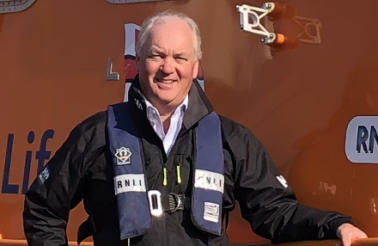Mark Dowie, chief executive of the Royal National Lifeboat Institution, is taking a 50% pay cut as part of the charity’s response to the coronavirus crisis.
The charity has also announced that 30% of its staff will be placed on furlough until the crisis is over, with a commitment to top-up salaries above the caps set by government.
Dowie told Civil Society News that his “two key priorities” during the outbreak were to “keep our people safe and to maintain the resilience and integrity of our search and rescue services”.
Pay: 'The right thing to do'
Dowie said that his decision to take a pay cut was driven by “a personal desire to do something that mattered for the charity”.
“I was a volunteer before I became a member of staff,” he said. “This just felt like the right thing to do for the charity I love.
“I thought I would be showing leadership, but also empathy with other volunteers, supporters and staff, many of whom will be experiencing quite extreme hardship as we go through this situation.”
He said it “became very obvious very quickly that we would need to take measures to sustain the charity through this”.
The RNLI has already closed all of its shops and museums until restrictions on social distancing are lifted, and anticipates losing much of the trading income that the summer season would normally bring.
Dowie’s annual salary was £160,000 last year, according to the RNLI website.
Forced to furlough
The charity is also planning to furlough around 1 in 3 of its staff under the government’s Coronavirus Job Retention Scheme.
The scheme commits to covering 80% of salary costs for furloughed workers up to £2,500, and RNLI says it will top-up those payments during April so that staff receive 100% of their wages. After that it plans to make sure that furloughed staff receive 80% of their salaries, where that is higher than the government’s monthly cap.
This will primarily affect colleagues “whose normal work and activities have been significantly restrained by the restrictions we are all living under,” Dowie explained, giving the examples of people building the charity’s lifeboats and staff in charge of training lifeguards.
Some staff are still working at the RNLI support centre in Poole, where essential duties are being carried out to keep the charity’s facilities running, but a lot of staff are now working remotely. “Everyone who can work effectively from home is working from home,” Dowie said.
Lifeguards stood down
One “big decision” taken in recent weeks was to suspend lifeguard duties. RNLI lifeguards normally work at hundreds of beaches across the country, but Dowie said this has been suspended to safeguard both staff and the public.
Lifeguards are required to work in pairs, he explained, which is incompatible with social distancing rules. In addition, “lifeguards on beaches encourage beach-goers. And at the moment that is seriously discouraged”.
'Planning for the worst and hoping for the best'
RNLI currently has eight months of free reserves, and Dowie says the charity will be “digging into” those reserves to get through the crisis.
“I don’t know quite how this is going to impact us as time goes on,” he admitted. “But we are planning for the worst and hoping for the best.”
In the meantime, search and rescue work remains the charity’s main focus. “We are completely committed to delivering that, come rain or shine, for the whole of the UK and Ireland,” he said. “That is a critical priority for me. It is why we exist. It is what we are determined to do.”
Dowie added: “We are coming up for our two hundredth anniversary in 2024, and we need to go into that strong and emerge stronger.
“That is going to take some work, and I am mad keen for everyone to get back on that challenge.”
Related articles












